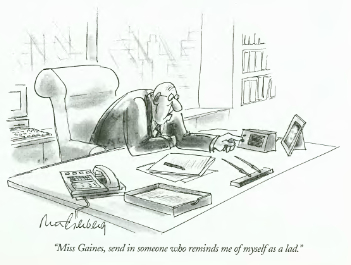Sometimes, You Feel Surrounded!
As you look around your organization, you may be wondering how the UEs that you observe slipped through the hiring process.
Or perhaps you’re a hiring manager who wants to avoid unknowingly bringing a UE on board.
Since managers are human, they often, awarely or unawarely, bring their own attitudes and personal preferences into the hiring and firing process. This can lead to (you guessed it) hiring or retaining a UE.
Watch Our for These Pitfalls When Hiring
Considerations of Race and Ethnic Background: As the New Yorker cartoon above suggests (“Miss Gaines, send me someone who reminds me of myself as a lad”), hiring managers can be influenced, consciously or not, by demographics. Professor Miller McPhearson, a sociologist at University of Arizona, notes that these factors are just a small fraction of the many irrelevant considerations such as weight, physical appearance, and dressing style that influence hiring decisions.
Interfolio, a Washington D.C. consulting group that helps universities hire the best teaching staff, recommends diversifying your hiring team to minimize the impact of these factors. They also counsel their higher ed clients to leave sufficient time for hiring decisions. That’s because, under time constraints, we are all more likely to fall back on habitual (and sometimes prejudicial) judgments. Even spending a few extra minutes with candidates who are not “like us” can open the door to a more impartial evaluation of what they bring.
Favoritism from the Boss: If a job candidate can develop a strong rapport with his hiring manager or future boss, he is often given preferential treatment. This person can easily morph into a UE who’s retained because the boss likes him, no matter how much trouble he’s creating for others. In his book, The No Asshole Rule, Stanford Business School Professor Bob Sutton explains how costly a boss’s unfounded favoritism can be for your entire organization.
Here is where checks and balances in the hiring process pay off. You, or whoever’s doing the hiring, should be able to solidly explain why a particular candidate is right for a job in your organization. Statement like, “She’s a great person,” or “I really liked his attitude” are red flags unless they’re backed up by other, substantive reasons.
“You Pays Your Money and You Takes Your Chances”
As hard as we try, it’s not always possible to weed out potential UEs in advance. Mistakes do get made. And sometimes, changing conditions in your organization reveal behavior problems that couldn’t have been anticipated.
If you find yourself managing a UE, it’s natural to wish that someone, anyone, had screened her out before she was hired.
Take a minute to be upset, and then turn to The 5Cs to help you move forward.


